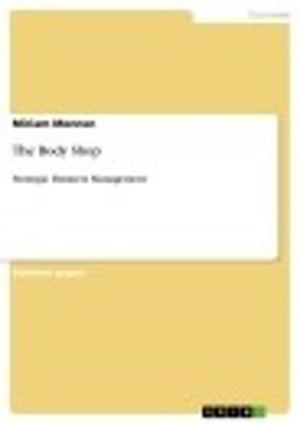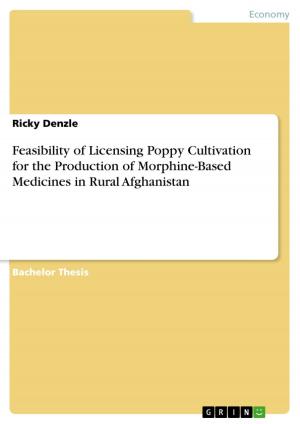| Author: | Adriana Zühlke | ISBN: | 9783638188760 |
| Publisher: | GRIN Publishing | Publication: | April 30, 2003 |
| Imprint: | GRIN Publishing | Language: | English |
| Author: | Adriana Zühlke |
| ISBN: | 9783638188760 |
| Publisher: | GRIN Publishing |
| Publication: | April 30, 2003 |
| Imprint: | GRIN Publishing |
| Language: | English |
Seminar paper from the year 2003 in the subject American Studies - Literature, grade: 1 (A), Ernst Moritz Arndt University of Greifswald (Institute for Anglistics/ American Studies), course: HS Writing the Line, Dividing the Land: The Mason-Dixon Line in History and Fiction, 7 entries in the bibliography, language: English, abstract: [...] Morrison's novel Beloved, which is discussed in this term paper, is full of emotions and feelings. It balances fear, hatred, tension, passion and also love, which appears in various forms such as motherly love, physical love or the abstract love of freedom. The analysis of this important and interesting theme focuses on questions like, e.g. How are feelings (especially love) presented and described? What significance do exemplarily selected relationships in the book have? How far are psychological aspects involved? Likewise, it is shed light on the political aspects in the book . Morrison questions the American maxim, which is stated in the Declaration of Independence, that 'all men are created equal' by showing how slaves worked, fought and even died for 'natural' human rights like freedom, the pursuit of happiness or, even more fundamental, the merely recognition as human beings. The multi-perspective view on the slaves' every-day live before, during and after the escape into freedom is both a fascinating and upsetting description of how slavery really was and, furthermore, an accusation of injustice and inhumanity throughout the time of slavery and today. In 2.0, the facets of slavery and its consequences are centred. It shall be shown how this dark part of the American history influenced, respectively manipulated, human beings and their actions and feelings. The analysis in 3.0 concentrates on the memory of the individual, i.e. it is examined whether and how it is possible for Sethe and other characters to overcome their horrible past. In addition, the issue of a collective memory is regarded. Moreover, the thesis that working through the past and overcoming it is closely connected with the supernatural, especially with the ghost of Beloved, is debated. Here, attention is turned in particular to Morrison's roots of African traditions and the question how (much) they inspired the book and in what respect they are interwoven in the plot. Throughout the whole analysis, such important aspects as the physical and psychological effects of slavery, the special situation of women and narrative and stylistic features are considered, the latter is surveyed more detailed in 4.0. In the conclusion it should be summed up what was found out and it is shortly reflected on the author's intention and message. At the end, a brief personal comment will be given on Beloved.
Seminar paper from the year 2003 in the subject American Studies - Literature, grade: 1 (A), Ernst Moritz Arndt University of Greifswald (Institute for Anglistics/ American Studies), course: HS Writing the Line, Dividing the Land: The Mason-Dixon Line in History and Fiction, 7 entries in the bibliography, language: English, abstract: [...] Morrison's novel Beloved, which is discussed in this term paper, is full of emotions and feelings. It balances fear, hatred, tension, passion and also love, which appears in various forms such as motherly love, physical love or the abstract love of freedom. The analysis of this important and interesting theme focuses on questions like, e.g. How are feelings (especially love) presented and described? What significance do exemplarily selected relationships in the book have? How far are psychological aspects involved? Likewise, it is shed light on the political aspects in the book . Morrison questions the American maxim, which is stated in the Declaration of Independence, that 'all men are created equal' by showing how slaves worked, fought and even died for 'natural' human rights like freedom, the pursuit of happiness or, even more fundamental, the merely recognition as human beings. The multi-perspective view on the slaves' every-day live before, during and after the escape into freedom is both a fascinating and upsetting description of how slavery really was and, furthermore, an accusation of injustice and inhumanity throughout the time of slavery and today. In 2.0, the facets of slavery and its consequences are centred. It shall be shown how this dark part of the American history influenced, respectively manipulated, human beings and their actions and feelings. The analysis in 3.0 concentrates on the memory of the individual, i.e. it is examined whether and how it is possible for Sethe and other characters to overcome their horrible past. In addition, the issue of a collective memory is regarded. Moreover, the thesis that working through the past and overcoming it is closely connected with the supernatural, especially with the ghost of Beloved, is debated. Here, attention is turned in particular to Morrison's roots of African traditions and the question how (much) they inspired the book and in what respect they are interwoven in the plot. Throughout the whole analysis, such important aspects as the physical and psychological effects of slavery, the special situation of women and narrative and stylistic features are considered, the latter is surveyed more detailed in 4.0. In the conclusion it should be summed up what was found out and it is shortly reflected on the author's intention and message. At the end, a brief personal comment will be given on Beloved.















